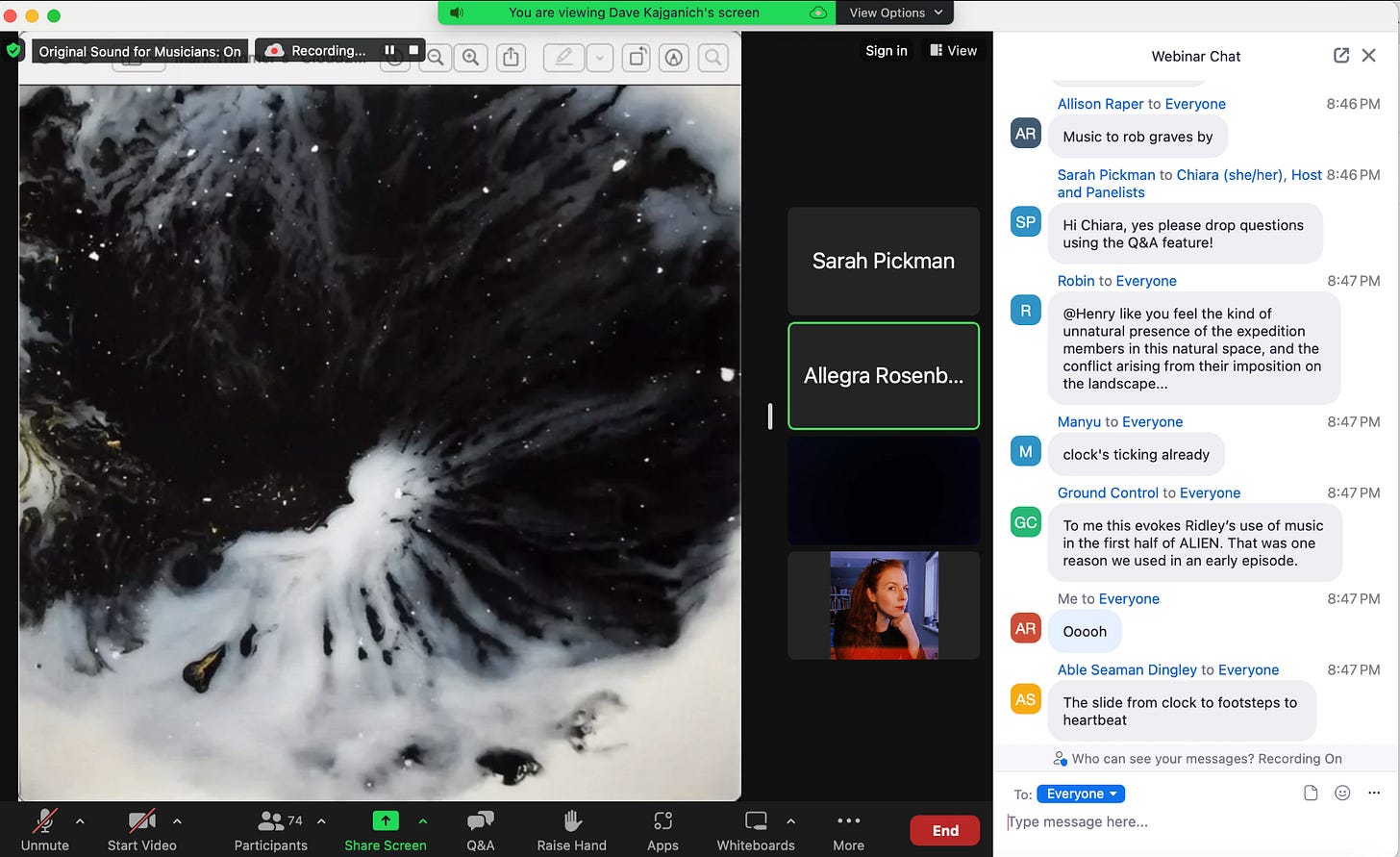Fan events
Against algorithmic discourse
This week in my capacity as director of Terror Camp, I organized listening parties for the release of The Terror’s soundtrack album The Last Sunset of the Year, which is also the final posthumous release of composer Marcus Fjellström. About 150 people over 2 sessions gathered on Zoom to listen to the 90-minute instrumental album, followed by a Q&A with showrunner David Kajganich and Erik Skodvin, the owner of the label putting the record out.
It was really fun! Terror fans are super lucky to have in Dave an insanely generous and kind showrunner who has consistently and spectacularly gone above and beyond for us, very much helping to maintain and grow the Terror’s cult following over the past 5 years.
Of course, not every fandom has a Dave; and not every fandom is, like the Terror’s, juuuust the right size and general vibe to support these kind of boutique, curated fourth-wall-crossing events.
But events are the lifeblood of a fandom: they can keep conversation and friendships alive, inject new ideas and stories into communities, and generally help hold off social entropy and decay (especially for fandoms with closed canons).
I first wore the fandom event organizer hat when I put together the 2013 Chicagoland-area Homestuck Prom at what was then my dad’s venue, the SPACE in Evanston. I remember teens coming from as far away as Indiana and Wisconsin to dance to pop music in the middle of the day (we couldn’t book it at night because there were concerts happening). I can’t find any pictures (thankfully..) but rest assured we had a fantastic time and at age 17 I felt, for the first time, the rush of having been the one to get people together.
Since then I have been big on fandom events, online and IRL. My tenure as a indie music gig booker in Los Angeles is tangentially related—I got the same kick out of putting them on—but not wholly synonymous, because those events were “public” in a way that a fandom event isn’t. (I will write at some point about the wiggly Venn Diagram that is fandom vs subculture).
Over the years I’ve enjoyed attending conventions big and small, participating in fanfiction exchanges and prompt memes, and spinning up many an event and participatory project. In the Terror community in particular I hit a productive vein, helping to produce a zine, a pin-up calendar, multiple fic exchanges, and of course kicking off Terror Camp, which is about to enter its fourth year.
Doing research for my book chapter about early online fandoms, I’m reading the 1993 book The Virtual Community by Howard Rheingold, an early participant in pioneering BBS the WELL, notably the online home of the Greatful Dead fandom in the 80s and early 90s. Rheingold might have been one of the first people to compare online communities with “third places,” highlighting the commonalities between a place like the WELL as a “tool for conviviality” and Ray Oldenburg’s conception of “the power of informal public life.” He wrote, presciently:
Perhaps cyberspace is one of the informal public places where people can rebuild the aspects of community that were lost when the malt shop became a mall. Or perhaps cyberspace is precisely the wrong place to look for the rebirth of community, offering not a tool for conviviality but a life-denying simulacrum of real passion and true commitment to one another. In either case, we need to find out soon.
He’s sort of right on both counts. Events and projects which emphasize the participatory in “participatory culture” are more important than ever, as the utopian promises of the virtual “third place” falter in the face of algorithmic and AI platform decay.
Purely anecdotally, I feel that a lot of the energy that would have at one point gone into building horizontal fan-to-fan relations through “gift economy” style works and transformative creativity now goes towards seeking direct approval from creators and engaging in performative, antagonistic discourse as a main fan “activity.” Summed up nicely by this tweet:
Of course while argument and heated discussion are in fandom’s DNA, I view discourse’s contemporary, algorithmically encouraged incarnation as as an entropic/negative force within fan spaces.
Panfandom events like Yuletide have been pillars for decades, and anime fandoms in particular have enthusiastic cultures around projects, events, and physical fanwork distribution, but the sheer effort that goes into building and running fandom events seems to be the sort of thing actively discouraged by the affordances of fandom’s current digital landscape—how would you run an exchange or promote a meetup on TikTok? Is it even worth it?
In the face of the seductive ease of passive, purely discursive “regurgitation”-type fandom, fan events are as important as they’ve ever been. Start exchanges! Plan meetups! Ask your canon’s creator if he wants to hop on Zoom and chat for an hour—anything is possible :)
Banger of the week
Note: I’m going to try to post more often moving forward — aiming at at least three posts a month, hopefully more, but not on any kind of regular schedule! If you want to subscribe, now would be a good time:


